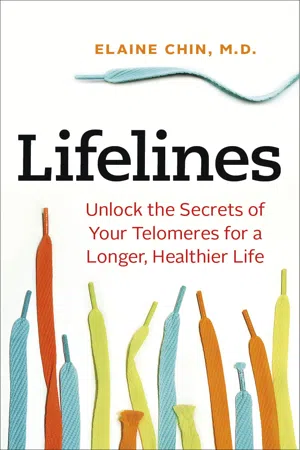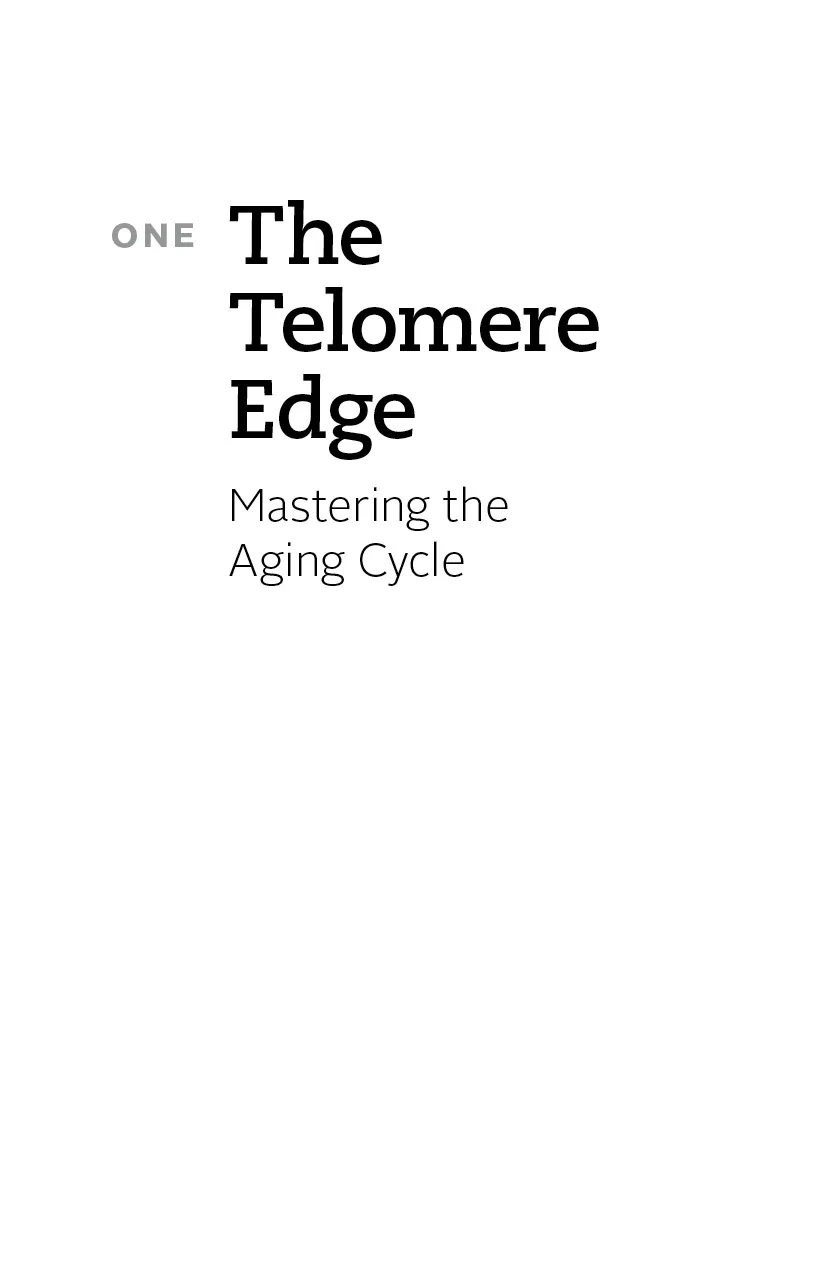![]()
![]()
The Foundation of Preventive Care
I’ve spent half of my twenty-five-year career as a doctor working with patients to predict if they’ll get really sick. I use genetics and measure their biomarkers to assess how their bodies are “ticking.” I then figure out how they can modify their lifestyles and adjust their diets, supplements, hormones, and medications to reduce their risk of disease.
I practice preventive care. It focuses on preventing you from getting sick rather than treating you after you get sick. It is also called personalized medicine, because when it comes to that ounce of prevention, one size definitely doesn’t fit all.
Ten years ago, preventive medicine represented only a tiny part of the health care system, and personalized medicine was pretty much a dream. Today, both are respected, real, and growing in influence. So tomorrow, it’s very possible we will be able to significantly slow down the ravages of the aging process.
Not everyone is a believer. Some ask me: “What evidence do you have that preventive care really works? Can you prove that your recommendations actually prevent disease and help people live longer?”
My physician colleagues ask me this, the media asks, and my patients and the public all ask too. My answer? A resounding yes. My supportive proof is the Nobel Prize–winning research into a field that simply didn’t exist a generation ago: telomere biology. Over the past twenty-five years, scientists have worked to uncover the incredible predictive ability of telomeres to determine your biological age. Their work was so significant that in 2009 the Nobel Prize in Medicine was awarded jointly to three scientists, Drs. Elizabeth Blackburn, Carol Greider, and Jack Szostak, for discovering how telomeres protect our chromosomes and identifying the importance of the enzyme telomerase in this process.
Together, these three scientists solved a huge mystery in biology. How can our chromosomes be copied completely when our cells divide and how can they be protected from decaying and “dying”?
To answer that question, the scientists had to research the long, threadlike DNA molecules that carry our genes and are packed into forty-six chromosomes. Telomeres are the caps on the ends of the chromosomes, like agelets, the plastic ends on shoelaces.
Drs. Blackburn and Szostak discovered that a unique DNA sequence, called the telomere, protects our chromosomes from degrading. Then Drs. Greider and Blackburn discovered telomerase, which produces telomere DNA. When telomeres become shortened to a critical length, cells “age.” On the other hand, if your body is producing enough telomerase, the length of your telomeres won’t shorten (sometimes they can actually grow) and automatic cell death, what science calls cellular senescence, is delayed.
The awarding of the Nobel Prize has caused a surge of interest in this field of medicine, and many more research groups are now working feverishly to determine which factors cause our telomeres to shorten before their time and how telomeres can be re-lengthened. It will take some years to learn how to re-lengthen our telomeres safely. But today we know much more about why they age prematurely and how we can slow our biological clocks, live longer, and stay healthier.
This is why I’m so committed to speaking out about how important telomeres are in not dying young. Not only can telomeres predict your future health, they can affect how long you’ll live and how free of disease you’ll be.
That’s pretty powerful information. Today, with a simple test, you can learn how long your telomeres are. That one measure alone tells you how much your cells have aged and gives you a measure of your true biological age. You should worry if your test shows that your cells have aged beyond your chronological age, or calendar age, compared to people like you in age and gender. But don’t run out to complete your bucket list on the basis of a telomere test. Instead, you should view your results as a chance to look at your life story so far and decide if you need to change a few things.
What’s the real promise of telomeres? You can make the right lifestyle choices to ensure that your telomeres stay long and robust. And? You’ll have as many years—and as many good years—as you possibly can. I can tell you that receiving my own test results, which I will share with you later in the book, made me look at my life in a whole new light.
First of all, I’m the only child of a Tiger Mom and I have the lifestyle and skills to show for it. I’m a doctor, I play the piano, I have a decent tennis swing, and I appreciate the difficulties of being a perfect ballerina. Yet today, I still think I haven’t achieved enough—surely the by-product of my upbringing.
Am I resentful about my childhood? Absolutely not. Well, okay, maybe a little. But after a lot of introspection, I’ve made peace with it. I’ve decided that, on balance, I’ve benefited. I immigrated to Canada from Hong Kong with my parents in 1969, when I was five years old. I don’t have any regrets that we came to Canada. Far from it. I’m incredibly thankful for what I have and the opportunities my parents have given me.
But when I was a child, I endured a less than ideal family life. My father was a devoted teacher. Because he was laid off a lot during his career, however, I was stressed and worried about our family never having enough money. My mother was a trailblazer. As a young woman, she worked as a senior civil servant in Hong Kong. I wasn’t born until she was in her mid-thirties. In Canada, she had to rebuild her career but was able to carry on her public-housing initiatives in Ontario until her retirement. Of course, nobody’s perfect—including my mom and dad. Perhaps they could have been better role models when it came to marriage and family life. Working hard is one thing, but moving emotionally away from one another will destroy a relationship. I probably didn’t learn enough life skills growing up in that kind of environment, and my marriage unraveled when my son was seven years old.
Being a doctor doesn’t make me immune to stress in my personal life or to the strain of parents becoming ill. I watched my elderly father deteriorate over the years from chronic obstructive pulmonary disease (COPD), a lung disease caused by smoking and observed sadly his gradual loss of dignity when he had to rely on help and needed oxygen to move around the house. He eventually died from lung disease. His biggest regret: smoking. My mother suffered from manic depression, now known as bipolar disorder (undiagnosed until I became a doctor), and suffered four bouts of cancer (mouth, breast, colon, and liver) before she finally succumbed to the disease when she was only 72 years old.
Why am I telling you about my parents and childhood?
I hope it will help you understand how genetics and environment act together to determine a person’s health destiny.
I believe strongly that by using this book as a guide, you can discover how your past experiences have made an impact on your health and what might be in store for your future. We all start to worry about how to stay healthier as we get older. How about you? What health issues have you faced? What kind of lifestyle do you have? Are you concerned that it has already affected your health?
Until now, all we could do was make an educated guess.
With telomere testing currently available to all of us, you now have an objective, scientific way to find out where you stand—a baseline—and what you need to do to protect that base at all costs.
I’ve often wondered if my childhood and family life might have caused my telomeres to shorten prematurely. Research shows that chronic stress shortens your telomeres. In a groundbreaking study to be discussed in more detail in Chapter 9, researchers found that mothers who were caring for chronically ill children had shorter telomeres than mothers who cared for generally healthy children. That shortening, in turn, leads to disease starting sooner rather than later. Or not at all. How you cope with the stress can reduce its damaging consequences.
But make no mistake: stress can kill you. Telomere science proves this to be true.
When you were conceived, your biological parents gave you a set of genes—the blueprint—which determine how your body functions. But in most cases, how you live your life and how you perceive it will determine when and if you stay well—or get sick.
A simple principle, isn’t it? In other words, a positive lifestyle and a positive attitude can determine pretty much everything.
I can say without a doubt that I live a healthy lifestyle. I never skip meals, and I eat a low-carb, low-red-meat diet, with lots of fish, fruits, and vegetables. I’ve never smoked (well, I had one drag of a cigarette when I was five years old because it looked so appealing... and my God, never again). I drink little alcohol—one glass socially one to two times per week, max. I sleep well, usually for seven hours (with the exception of when I was on call as an intern in a hospital), and I stay active, but I’m not an exercise freak.
Is that enough for me to stay healthy for my entire life-span? Is what I do enough to keep my telomeres from shortening prematurely?
Before I got tested and found out my telomere length, I believed (and so did many people close to me) that I had a good chance of having shorter telomeres than the average person because of the chronic pressures in my life. I wondered whether lifestyle and a positive outlook could really compensate for the physical damage caused by emotional stress.
As you read further into this book, I encourage you to complete your own self-audit. See how you measure up. Perhaps you’ve burned the candle at both ends at some point in your life and worry about that coming back to hurt you. Don’t fret. Instead, let’s figure out what you can do now to make up for your past.
I’m always as intrigued as my patients are to learn about their telomere results. Certainly, when patients get a better result than they expected, I see on their faces how relieved they are that they’ve “gotten away” with it. Conversely, for those who get unexpectedly poor results, we have to discover what led to such outcomes. Given either result, the test is always a motivation to improve one’s lifestyle behavior, especially to stop smoking, drink less, and exercise to achieve a healthier weight. No one likes to lose their telomere length prematurely. The common driving force to change behavior is to stop tempting fate.
Deep inside our psyches, many of us would like to live forever—so long as we’re of sound mind and free of disability and disease. Who wouldn’t want to achieve this health goal?
If you want to know how to start on the path of living longer now and can make the leap of faith in the new science of telomeres, this book is for you. After going over the reasons why I have devoted my life to following this science, I will give you the keys to the Peak Health Program. I’m going to show you how to assess your baseline measurements so that you can determine what you need to include in your day-to-day routine to live in a state of excellent health. I have patients right now who have tested their telomeres and are already living better and healthier. Not only are they “feeling” the rewa...



